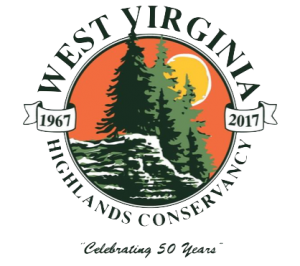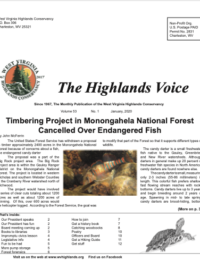By John McFerrin, The Highland Voice, Page 4, January 2020
As we all learned in school, we have three branches of government: legislative, executive, and judicial. With the Atlantic Coast Pipeline we are now seeing an example of one way that works in the real world. More specifically, the question is whether (and under what conditions) the Atlantic Coast Pipeline can cross the Monongahela National Forest and the Appalachian Trail.
In order to cross the Monongahela National Forest, the Atlantic Coast Pipeline has to get permission from the United States Forest Service. It also has to get permission from somebody (still not clear on who that somebody is; more on that later) to cross the Appalachian Trail.
When it was seeking permission from the executive branch (the Forest Service), the Atlantic Coast Pipeline was doing well. After some initial questioning, making noises as if it might not grant permission, the Forest Service gave the go-ahead. It also gave the Pipeline permission to cross the Appalachian Trail.
Then came the judicial branch, in the form of the United States Court of Appeals for the Fourth Circuit. It reviewed the work of the Forest Service and concluded that the Forest Service had not been sufficiently diligent in its review of the pipeline crossing the National Forest. It did not necessarily conclude that the Forest Service had reached the wrong conclusion. It just concluded that the Forest Service had not tried very hard to evaluate the environmental impacts of the project. This sent the Forest Service back to the drawing board for another try.
The Court also ruled that the Forest Service did not have the authority to give the Atlantic Coast Pipeline permission to cross the Appalachian Trail.
With this ruling, there is no going back to the drawing board. Either the Forest Service has authority or it doesn’t; the Court says it doesn’t. No trip back to the drawing board will fix that. Dominion has to either live with the ruling or appeal to a higher court.
Dominion chose to appeal. The United States Supreme Court has agreed to hear the case; a hearing is set for February, 2020. There was a long story about that case in the November, 2019, issue of The Highlands Voice.
It is the public position of the Atlantic Coast Pipeline, of course, the Court of Appeals for the Fourth Circuit was wrong, that the Supreme Court will correct the problem, it will have permission to cross the Appalachian Trail and dirt will fly. Those who challenge the pipeline are equally confident that the Court was right, that the Supreme Court will agree, and the Atlantic Coast Pipeline will have to figure out some way to avoid the Appalachian Trail.
In such a situation, Dominion (main developer of the Atlantic Coast Pipeline) might decide to hedge its bets. It would do so by approaching Congress, the legislative branch.
While the Atlantic Coast Pipeline is a very big deal around here, it is not such a big deal in the rest of the country. Relief for the developers would have to come as a tiny little afterthought hooked onto something bigger. Dominion’s lobbyists would have to persuade some key legislators to do this: “Congress hereby passes a VERY BIG THING and, by the way, the Atlantic Coast Pipeline is allowed to cross the Appalachian Trail.”
In mid-December the West Virginia Highlands Conservancy took a step to avoid this result. By letter, we and several other groups asked Congressional leaders to refuse to allow any legislation to approve the Atlantic Coast Pipeline, including its crossing of the Appalachian Trail. We pointed out that we didn’t think the Pipeline was such a good idea to begin with. Even if it were, there were questions about permits and permissions other than the one that would allow it to cross the Appalachian Trail. We though that the best course of action was to let the courts sort all this out without Congress wading into the fray.
>> John McFerrin is the Secretary of the Highlands Conservatory, working for preservation and protection of the mountains and streams of West Virginia with a focus on wilderness and areas with recreation, scenic, geologic, biologic and historic importance.
V. V. V. V. V. V. V. V. V. V. V. V. V. V. V. V. V. V. V. V. V. V. V
>>> AVAILABLE FROM THE HIGHLANDS CONSERVANCY >>>
1. Monongahela National Forest Hiking Guide, $18.95 plus shipping.
2. Fighting to Protect the Highlands, the First 40 Years of the WV Highlands Conservancy, $15.95 plus shipping, free with new membership.
3. Membership categories range from $15 to $750 per year for individuals or families.
Join or order on-line at www.wvhighlands.org
WV Highlands Conservancy
P.O. Box 306
Charleston, WV 25321


